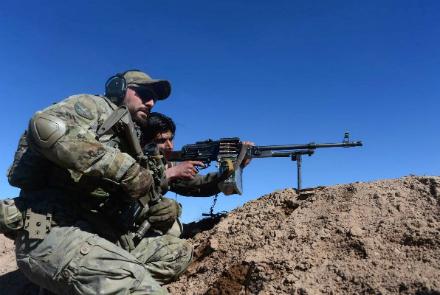Special Inspector General for Afghanistan Reconstruction (SIGAR) on Thursday released an audit of Department of Defense (DOD)-funded advising efforts in the Afghan Ministry of Defense (MoD) and Ministry of the Interior (MoI) and found the DOD lacks a baseline and consistent metrics to measure progress, meaning DOD cannot assess the effectiveness of the advising effort over time.
The audit was carried out for the period January 2015 to April 2018.
SIGAR found that since 2010, DOD has awarded four contracts, worth $1.62 billion to DynCorp International to provide contract advisors at MoD and MoI. Two of these contracts, worth $421 million, are ongoing and expected to end in November 2018.
Because DOD has not fully planned, monitored, or evaluated it, the progress and impact of DOD's advising efforts to build the MoD and MoI capacity is unknown, despite millions of US dollars in funding over the past three years.
The report stated that DOD, US Congress, and US taxpayers lack the information necessary to assess the impact the advising effort has made in building the capacity of MoD and MoI, or the effectiveness of its $421 million advising contracts.
SIGAR found that DOD lacks a baseline and consistent metrics to measure progress, meaning DOD cannot assess the effectiveness of the advising effort over time.
DOD cannot track progress, if any, at MOD and MOI because the advising goals and rating system used to measure progress toward meeting those goals has frequently changed.
SIGAR stated in its report that the DOD does not know whether the advisors assigned to MoD and MoI are meeting goals and milestones because it has not assessed, monitored or evaluated the advising efforts as required by its own guidance.
“Specifically, DOD was not following its security cooperation oversight guidance, DOD Instruction 5132.14, Assessment, Monitoring, and Evaluation Policy for the Security Cooperation Enterprise, which requires it to monitor the progress of its security cooperation assistance using a standard assessment, monitoring, and evaluation program,” read the report.
SIGAR stated: “While initially DOD officials told us that this instruction did not apply to its advising effort at the MoD and the MoI, in April 2018 and in a response to SIGAR’s preliminary findings, DOD changed its position and agreed that current methods of assessment were insufficient. In addition, DOD cannot track progress, if any, at the MoD and the MoI because the advising goals and rating system used to measure progress toward meeting those goals has frequently changed.”

The report went on to state that from January 2015 to December 2016, 96 percent of the plans of action and milestones (POAM) goals for MoD and 86 percent of the POAMs for MoI changed.
DOD reassigns personnel to advising duties once they are in Afghanistan, but does not track reassignments. As a result, neither the Joint Chiefs of Staff nor those responsible for planning staffing requirements know whether they are requesting personnel with the right type of experience or enough personnel for advising positions at the ministries, SIGAR stated.
They also found that DOD does not ensure that all uniformed personnel complete advisor training before deploying to Afghanistan, despite CENTCOM requirements.
In an anonymous survey conducted by SIGAR, nine out of 20 deployed US military personnel serving in advising roles indicated that they did not receive any advisor training before deploying. Furthermore, according to officials interviewed, the uniformed advisors tend to have the least advisory specific training.
According to a former CSTC-A Commander: "Proper training is probably the most important aspect that must be addressed during pre-deployment training." However, CENTCOM could not tell SIGAR which uniformed personnel attended required programs, and the command does not track which advisors complete training.
The Special Inspector General for Afghanistan Reconstruction John F. Sopko said however that they are making four recommendations.
He also said that DOD had concurred with all four recommendations mentioned in the draft report.

Sopko said the DOD stated that it is fully committed to complying with all departmental policies regarding security cooperation assistance, including, but not limited to, DOD Instruction 5132.14. With regard to the second recommendation, DOD noted that the ministerial advising effort must be designed so all types of advisors—military, civilian, and contractors—are working in unison to build capacity at the ministries.
He said that with regard to the third recommendation, DOD stated that it will direct the appropriate organizations to identify and track all positions that are intended to perform advisory functions. Finally, with regard to the fourth recommendation, DOD acknowledged concerns about the number of training waivers US Central Command has issued and committed to review ways to address the problem.
CLICK HERE for full report


